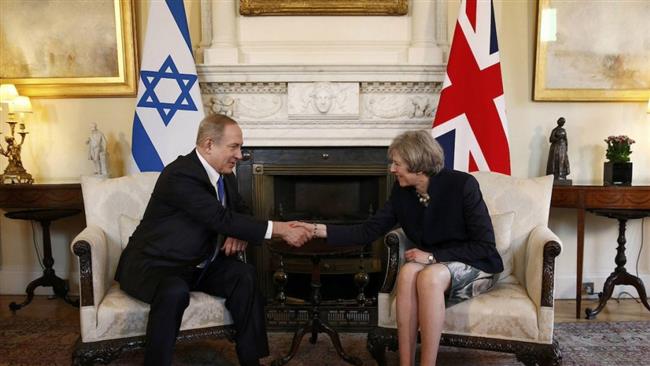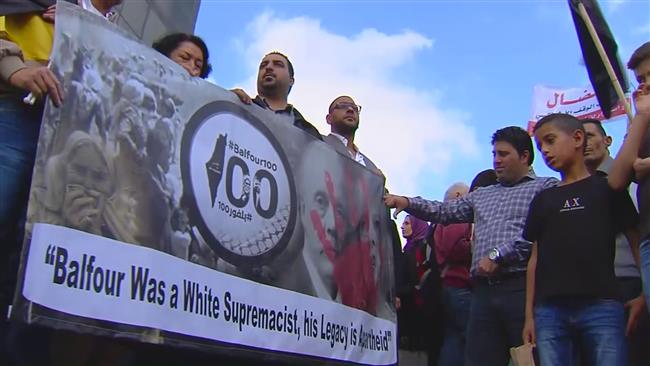May: UK proud of spearheading Israel's creation 100 years ago
Speaking on the issuance of Balfour Declaration’s centenary, Britain’s Prime Minister Theresa May says her country takes pride in spearheading creation of Israel through releasing the declaration.
The Balfour Declaration was a public statement issued by the UK government during World War I announcing support for creation of Israel. It was named after Lord Arthur Balfour, the then foreign secretary who penned the document, which turned 100 on Thursday.
Palestine was under British rule when Balfour issued the policy statement.
Palestinians view the declaration as a prelude to the Israeli occupation of their homeland in 1948, saying the UK government should apologize for issuing the document.
Speaking at Balfour centenary dinner in London, May said Britain was “proud of our pioneering role in the creation of the state of Israel.”
She also said Britain was proud “of the relationship we have built with Israel.”
“As we work together towards Balfour’s vision of a peaceful co-existence, we must be equally clear that there can never be any excuses for boycotts, divestment or sanctions: they are unacceptable and this government will have no truck with those who subscribe to them,” May added.
The Boycott, Divestment, Sanctions (BDS) movement has attracted considerable support among pro-Palestinian people and circles worldwide. The campaign seeks to cut the flow of funds from foreign sources and donors to illegal Israeli settlements and the regime’s illegal construction activities.
Emboldened by the Balfour Declaration and the ensuring Western support, Israel captured huge swathes of Arab land in a war in 1948, and then proclaimed its existence.
In 1967, it proceeded to capture more Palestinian territory in another war. It then started propping up scores of settlements across the land in a move to gradually annex it.
May said that the regime had to make compromises “including an end to the building of new settlements,” stopping short of offering her opinion on what was to happen to the ones the regime had already propped up.
Tel Aviv has defied all international condemnations of its settlement activities, including outright denunciation by the United Nations.
Emily Thornberry, the British shadow foreign secretary, attended the centenary ceremony on behalf of Labor leader, Jeremy Corbyn, who had said he could not turn up. The Guardian said the no-show “was read as a snub by some in Israel.”

In a statement, Corbyn called on the British government to recognize Palestine. He said, “Balfour promised to help establish a national home for the Jewish people in Palestine while pledging that nothing would be done to prejudice the rights of its ‘existing non-Jewish communities.”
“A hundred years on, the second part of Britain’s pledge has still not been fulfilled and Britain’s historic role means we have a special responsibility to the Palestinian people, who are still denied their basic rights,” the statement added.
Israeli Prime Minister Benjamin Netanyahu, who is on a five-day visit to Britain, was also present at the centenary. The premier, during whose incumbency the settlement construction has gathered unprecedented speed, claimed, “Israel is committed to peace, I’m committed to peace.”
Meanwhile, thousands of Palestinians marched in the city of Ramallah in Tel Aviv-occupied Palestinian territory of West Bank from the city center to the British consulate, with many waving black flags and banners with slogans such as “100 years of dispossession.”
The office of president of the Palestinian Authority, Mahmoud Abbas released a statement, calling on the British government to “apologize to the Palestinian people for the suffering caused as a result of the Balfour Declaration a hundred years ago.”
“The second day of November marks the centennial of the disastrous Balfour Declaration, which, in 1917, the British government gave the Jews of the world a national homeland in Palestine while it was aware that Palestine is owned and inhabited by another people, the Palestinian people,” the statement said.
Abbas called the declaration “null and void” given that it ignored the national and political rights of the indigenous Palestinian people.
VIDEO | Intl. day to end anti-women violence: Female victims of Israeli attacks on Gaza, Lebanon remembered
Leader: Arrest warrant not enough, Netanyahu must be executed
VIDEO | Iraqi fighters conduct fresh retaliatory attacks on vital Israeli targets
Gaza hospital chief calls for help amid Israel’s ‘extermination campaign’
‘Israel delusional’: Hamas says US ‘full support’ enabled genocide, urges Biden to ‘atone’
Nov. 24: ‘Axis of Resistance’ operations against Israeli occupation
Iran’s IRGC Ground Force, Azerbaijani army kick off joint military drill
VIDEO | Security officers injured, one person killed in Amman shooting












 This makes it easy to access the Press TV website
This makes it easy to access the Press TV website